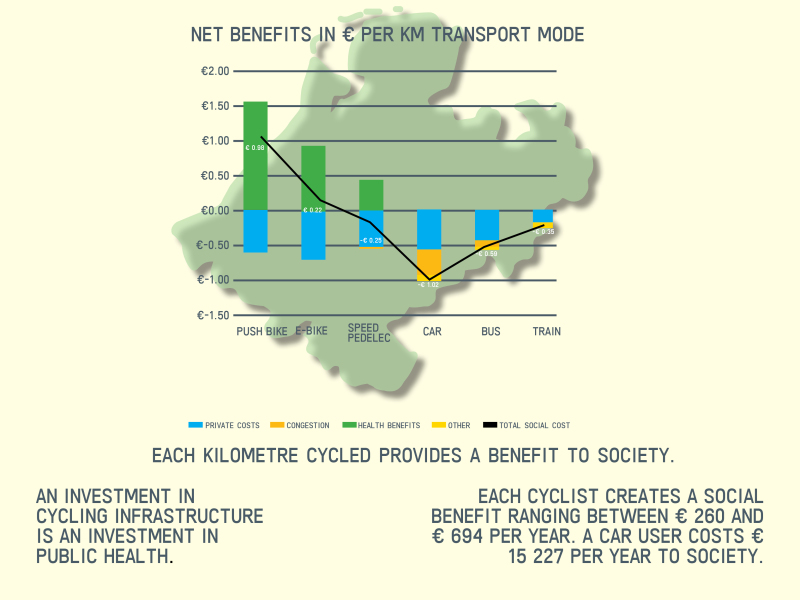Cost-benefit analysis of cycling in Benelux and North Rhine-Westphalia
22026
2022
TML investigated the costs and benefits of cycling in the Benelux and North Rhine-Westphalia through a cost-benefit analysis. We compared the social costs and benefits of different transport modes and applied this analysis to a possible cycle highway between Arlon and Luxembourg, identifying the impact of three bicycle types (traditional bicycle, e-bike, and speedpedelec).
TML examined the costs and benefits of cycling in Benelux and North Rhine-Westphalia (NRW). We first compared the social costs and benefits of different forms of passenger transport, in particular cycling, car, bus and train. We then calculated these social costs and benefits for a practical case study: the construction of a possible bicycle highway between Arlon and Luxembourg. Total social costs and benefits were defined as the sum of private costs and benefits (those of the user) and externalities (the costs and benefits for the rest of society). We did this for three different types of bicycles (traditional bicycle, e-bike and speed-pedelec), car, bus, and train.
Based on a cost-benefit analysis (CBA), TML showed that cycling is the most advantageous mode of transport. Every trip by bicycle produces a net welfare gain, unlike the car, which generates a social cost for every kilometre travelled. The benefits of cycling are mainly health benefits: regular cycling leads to less illness and lowers the risk of early death. Because cyclists are healthier, they lead to savings for social security. Moreover, a cycling employee is more productive than someone who does not exercise regularly. Since the value of labour productivity is quite high in the Benelux-NRW region, the resulting productivity gains are the biggest health benefit.
We also showed that there is sufficient potential for an international cycle highway between Arlon and Luxembourg. Realising such a cycle highway by optimising existing infrastructure would lead to nine times more social benefits than costs.
The study ended with several policy recommendations. We will transfer these to the policymakers of the different regions to further strengthen cycling policy in each region. The study will also be an important part of the Bicycle Roadmap that the Benelux General Secretariat is developing to further promote bicycle use in the region.
The Luxembourg press wrote an article on this study.
TML examined the costs and benefits of cycling in Benelux and North Rhine-Westphalia (NRW). We first compared the social costs and benefits of different forms of passenger transport, in particular cycling, car, bus and train. We then calculated these social costs and benefits for a practical case study: the construction of a possible bicycle highway between Arlon and Luxembourg. Total social costs and benefits were defined as the sum of private costs and benefits (those of the user) and externalities (the costs and benefits for the rest of society). We did this for three different types of bicycles (traditional bicycle, e-bike and speed-pedelec), car, bus, and train.
Based on a cost-benefit analysis (CBA), TML showed that cycling is the most advantageous mode of transport. Every trip by bicycle produces a net welfare gain, unlike the car, which generates a social cost for every kilometre travelled. The benefits of cycling are mainly health benefits: regular cycling leads to less illness and lowers the risk of early death. Because cyclists are healthier, they lead to savings for social security. Moreover, a cycling employee is more productive than someone who does not exercise regularly. Since the value of labour productivity is quite high in the Benelux-NRW region, the resulting productivity gains are the biggest health benefit.
We also showed that there is sufficient potential for an international cycle highway between Arlon and Luxembourg. Realising such a cycle highway by optimising existing infrastructure would lead to nine times more social benefits than costs.
The study ended with several policy recommendations. We will transfer these to the policymakers of the different regions to further strengthen cycling policy in each region. The study will also be an important part of the Bicycle Roadmap that the Benelux General Secretariat is developing to further promote bicycle use in the region.
The Luxembourg press wrote an article on this study.
Period
2022Client
Benelux General SecretariatPartner
FOD Mobiliteit en Transport (Belgium)Departement Mobiliteit & Openbare werken (Flanders)
Service Public Wallonie, Mobilité et Infrastructures (Wallonia)
Brussel Mobiliteit (Brussels)
Ministerie van Infrastructuur en Waterstaat (the Netherlands)
Ministère de la Mobilité et des Travaux publics (G.D. Luxembourg)
Ministerium für Verkehr des Landes Nordrhein-Westfalen


